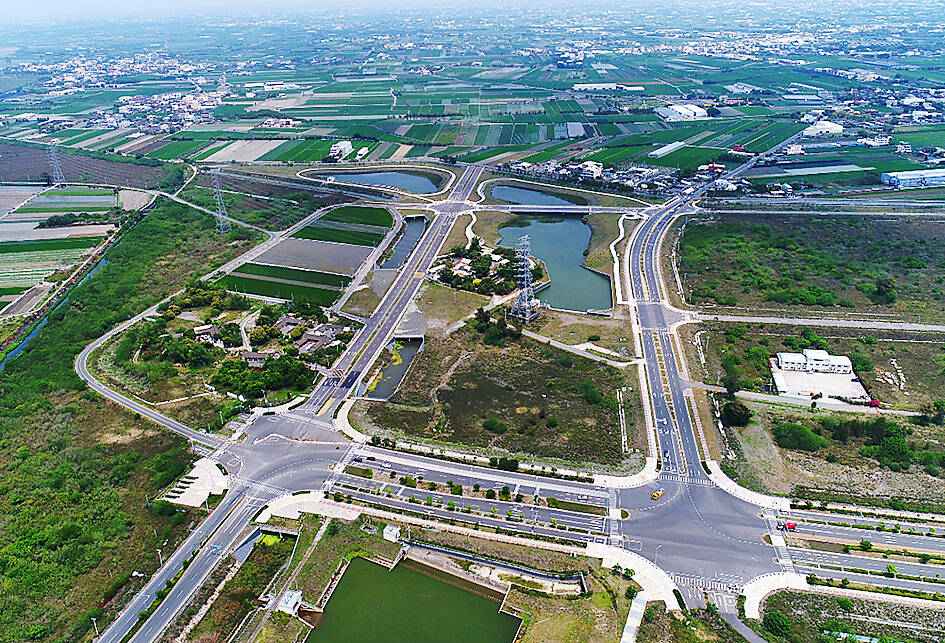Wafer Works Corp (合晶科技) yesterday announced a NT$15 billion (US$470.7 million) wafer plant investment at the Central Taiwan Science Park (中部科學園區) to cope with rising demand for auto chips.
Construction of the 12-inch fab should begin soon, the Taoyuan-based silicon wafer manufacturer said, adding that it would become operational in 18 months to two years, it said.
The fab, to be built on the science park’s campus in Changhua County’s Erlin Township (二林), is planned to have an installed capacity of 200,000 wafers a month, the company said.

Photo courtesy of Central Taiwan Science Park Administration
Wafer Works is operating a 12-inch wafer test line, with monthly output expected to reach 20,000 units by the end of this year.
It is crucial for the company to operate a 12-inch fab to meet customers’ rising demand for auto chips and a migration from 8-inch to 12-inch wafers in the semiconductor industry, a company spokesman told the Taipei Times.
“We are optimistic about the company’s business, as demand from the automotive segment remains resilient,” the spokesman said.
“Besides, demand might rebound when the fab becomes operational in one-and-a-half years to two years. If not, the company will adapt itself to the macro-environment by slowing down its capacity expansion,” he added.
Wafer Works said the utilization rate of its 8-inch fabs remains healthy at 90 to 95 percent.
However, demand for 6-inch wafers has dropped significantly, causing a decline of 10 to 20 percent in factory usage, as customers have been building inventory since 2019, it said.
The company said third-quarter revenue is likely to hit a record high, given robust customer demand.
In the first eight months of this year, revenue soared 30.6 percent year-on-year to NT$7.32 billion, company data showed.
Wafer Works last year generated about 70 percent of its revenue from 8-inch wafers and 27 percent from 6-inch wafers. About 2.6 percent of total revenue came from 12-inch wafers.
By application, about half of the company’s revenue last year came from the automotive segment, its data showed.
The Central Taiwan Science Park Administration said 36 companies have gained approval to build factories on the Erlin campus, with a pledged total investment of NT$107 billion.

CHIP RACE: Three years of overbroad export controls drove foreign competitors to pursue their own AI chips, and ‘cost US taxpayers billions of dollars,’ Nvidia said China has figured out the US strategy for allowing it to buy Nvidia Corp’s H200s and is rejecting the artificial intelligence (AI) chip in favor of domestically developed semiconductors, White House AI adviser David Sacks said, citing news reports. US President Donald Trump on Monday said that he would allow shipments of Nvidia’s H200 chips to China, part of an administration effort backed by Sacks to challenge Chinese tech champions such as Huawei Technologies Co (華為) by bringing US competition to their home market. On Friday, Sacks signaled that he was uncertain about whether that approach would work. “They’re rejecting our chips,” Sacks

NATIONAL SECURITY: Intel’s testing of ACM tools despite US government control ‘highlights egregious gaps in US technology protection policies,’ a former official said Chipmaker Intel Corp has tested chipmaking tools this year from a toolmaker with deep roots in China and two overseas units that were targeted by US sanctions, according to two sources with direct knowledge of the matter. Intel, which fended off calls for its CEO’s resignation from US President Donald Trump in August over his alleged ties to China, got the tools from ACM Research Inc, a Fremont, California-based producer of chipmaking equipment. Two of ACM’s units, based in Shanghai and South Korea, were among a number of firms barred last year from receiving US technology over claims they have

BARRIERS: Gudeng’s chairman said it was unlikely that the US could replicate Taiwan’s science parks in Arizona, given its strict immigration policies and cultural differences Gudeng Precision Industrial Co (家登), which supplies wafer pods to the world’s major semiconductor firms, yesterday said it is in no rush to set up production in the US due to high costs. The company supplies its customers through a warehouse in Arizona jointly operated by TSS Holdings Ltd (德鑫控股), a joint holding of Gudeng and 17 Taiwanese firms in the semiconductor supply chain, including specialty plastic compounds producer Nytex Composites Co (耐特) and automated material handling system supplier Symtek Automation Asia Co (迅得). While the company has long been exploring the feasibility of setting up production in the US to address

OPTION: Uber said it could provide higher pay for batch trips, if incentives for batching is not removed entirely, as the latter would force it to pass on the costs to consumers Uber Technologies Inc yesterday warned that proposed restrictions on batching orders and minimum wages could prompt a NT$20 delivery fee increase in Taiwan, as lower efficiency would drive up costs. Uber CEO Dara Khosrowshahi made the remarks yesterday during his visit to Taiwan. He is on a multileg trip to the region, which includes stops in South Korea and Japan. His visit coincided the release last month of the Ministry of Labor’s draft bill on the delivery sector, which aims to safeguard delivery workers’ rights and improve their welfare. The ministry set the minimum pay for local food delivery drivers at